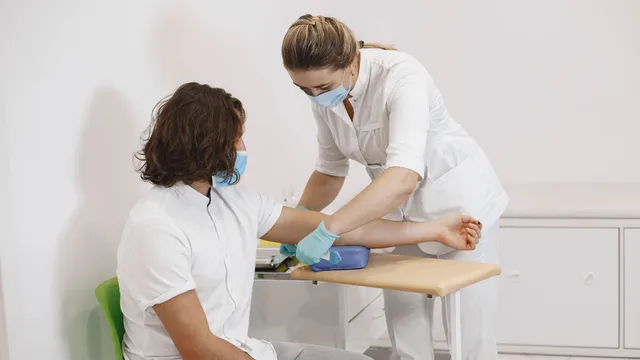- By Priyanka Munshi
- Tue, 15 Apr 2025 05:38 PM (IST)
- Source:JND
In today’s fast-paced lifestyle, preventive healthcare has become more important than ever. Women often juggle multiple responsibilities careers, family, and caregiving which can lead to neglecting their own health. Regular screenings and blood tests are vital tools for early detection and prevention of diseases. Here’s an age-wise guideline for women to stay on top of their health. In a conversation with Jagran English, Dr. July Mehta, Consultant Pathologist at Metropolis Healthcare Ltd., talked about the essential health tests every woman should undergo annually in her 20s, 30s, 40s, and beyond.
Women In Their 20s (20–29 years):
Complete Blood Count (CBC) & Serum Iron Study
Why: Anaemia is highly prevalent among Indian women, particularly in the reproductive age group. Low haemoglobin and iron levels can lead to fatigue and reduced immunity.
When: If you experience fatigue, weakness, dizziness, or pale skin.
Thyroid Function Test
Why: To detect thyroid disorders such as hypothyroidism or hyperthyroidism, which are common in women.
When: If you have symptoms like weight changes, fatigue, mood swings, menstrual irregularities, or a family history of thyroid illness.
Women In Their 30s (30–39 years)
PAP Smear / HPV Self-Sampling Test
Why: To screen for cervical cancer, which is the fourth most common cancer globally and the second most common among Indian women.
When: Every 5 years after age 30. It helps detect pre-malignant changes and HPV infections.
Vitamin D Level
Why: Vitamin D deficiency is common due to low sun exposure, poor nutrition, and a sedentary lifestyle. It can lead to weak bones and muscle pain.
When: If you have limited sun exposure, darker skin tone, or a history of bone fractures.
Serum Folic Acid
Why: Folate is essential for red blood cell formation and is critical for women planning pregnancy to prevent neural tube defects.
When: If you’re planning to conceive or show symptoms like fatigue, mouth sores, or irritability.
Women In Their 40s (40–49 years)
Blood Glucose Test
Why: To screen for diabetes or prediabetes, which are increasingly common due to lifestyle factors.
When: Every 3 years, or more frequently if overweight, hypertensive, or with a family history of diabetes.
Mammogram
Why: To detect breast cancer early, especially if there is a family history of the disease.
When: Every 1–2 years, depending on personal risk factors.
Lipid Profile
Why: To assess cholesterol levels and screen for cardiovascular disease risk.
When: If you have high blood pressure, obesity, or a family history of heart disease or high cholesterol.
Familial Cancer Screening (if applicable)
Why: For women with a strong family history of cancers (breast, ovarian, uterine), genetic testing for mutations like BRCA1 & BRCA2 is recommended.
When: Based on consultation with a physician and presence of family history.
Women Aged 50 And Above
Bone Mineral Density Test (Bone Scan)
Why: To detect osteoporosis and assess bone health, especially post-menopause.
When: Starting at age 65, or earlier if you have risk factors like early menopause, fractures, or a family history of osteoporosis.
Cancer Screening Markers (e.g., CA125, CA19.9, CEA)
Why: These are blood-based markers that can help detect certain cancers early as part of a preventive health check-up.
When: Advised for women with personal or family history of cancers, or as guided by a physician.
Hereditary Cancer Gene Testing
Why: Identifies genetic predisposition to certain cancers.
When: If there's a personal or strong family history of cancers, especially breast, ovarian, or colon cancer.
In conclusion, Dr. July Mehta stated in her conversation with Jagran English, “Regular health check-ups empower women to take proactive steps toward their well-being. Identifying health issues early through age-appropriate tests ensures better outcomes, improved quality of life, and peace of mind. Prevention is always better than cure—make your health a priority.”

